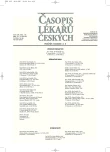-
Medical journals
- Career
Cognitive Functions Impairment in Diabetes Mellitus Patient
Authors: R. Přikryl
Authors‘ workplace: Psychiatrická klinika LF MU a FN, Brno
Published in: Čas. Lék. čes. 2007; 146: 434-437
Category: Review Article
Overview
An increased research interest in the relation between diabetes mellitus and dementia or deterioration of cognitive functions has been recently noticed. The relatively rich scientific literature in this topic shows that diabetes mellitus itself can cause an impairment of cognitive functions regardless patient’s age or the fact whether he has type 1 or type 2 diabetes mellitus. Type 1 diabetes mellitus leads to a psychomotor retardation while type 2 diabetes mellitus tends to be associated with impaired storage of new information. The exact mechanism through which diabetes impairs cognition has not been explained sufficiently yet, but several hypothetical mechanisms which might explain the relation between diabetes and impaired cognition have been proposed. To explain the etiopathogenetic mechanisms underlying the relation between diabetes and dementia, further research, especially research focused on process clinical-imaging studies or clinical-pathological studies is necessary. As far as clinical practice is concerned, it is important to bear in mind that prevention, timely diagnosis and optimum treatment of diabetes may help to reduce incidence of dementia or cognitive functions’ impairment.
Key words:
diabetes mellitus, dementia, cognition, impairment.
Labels
Addictology Allergology and clinical immunology Angiology Audiology Clinical biochemistry Dermatology & STDs Paediatric gastroenterology Paediatric surgery Paediatric cardiology Paediatric neurology Paediatric ENT Paediatric psychiatry Paediatric rheumatology Diabetology Pharmacy Vascular surgery Pain management Dental Hygienist
Article was published inJournal of Czech Physicians

-
All articles in this issue
- Bioequivalence Studies of Pharmaceutical Preparations
- Cognitive Functions Impairment in Diabetes Mellitus Patient
- Stem Cells, Stem Cell Therapy, and Ethical Problems of Medicine
- Present View on the Spinal Haemangioma
- Phototoxic Reaction After the Systemic Administration of Antimicrobial Drugs
- Problems of Regulation of Breathing
- Conjugated Linoleic Acid – The Dietary Supplement in the Prevention of Cardiovascular Diseases
- Transcription Factor Egr-1 in Cardiovascular Biology
- Incidence, Diagnostics and Therapy of the Lung Cancer in the Czech Republic in 2003
- Study of the Eosinophilic Inflammation Activity in Bronchial Asthma
- Composition of the Nonesterified Fatty Acids and Lipid Peroxidation in Metabolic Syndrome
- Prospects of Body Composition Analysis by Bioimpedance Method in Children
- The Assessment of Body Composition in Patients with Thyroid Dysfunction
- Is Prescription of Physical Activity a Part of Health Care in Civilization Disorders? Results of Questionnaire Study in Medical Doctors
- Stress Cardiomyopathy
- Journal of Czech Physicians
- Journal archive
- Current issue
- Online only
- About the journal
Most read in this issue- Bioequivalence Studies of Pharmaceutical Preparations
- Study of the Eosinophilic Inflammation Activity in Bronchial Asthma
- Stress Cardiomyopathy
- Is Prescription of Physical Activity a Part of Health Care in Civilization Disorders? Results of Questionnaire Study in Medical Doctors
Login#ADS_BOTTOM_SCRIPTS#Forgotten passwordEnter the email address that you registered with. We will send you instructions on how to set a new password.
- Career

